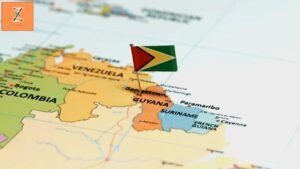9 Fascinating Facts About Guyana You’ll Love to Know

Nestled on the northern coast of South America, Guyana is a hidden gem boasting diverse natural wonders, a rich cultural tapestry, and a fascinating history. This English-speaking country offers breathtaking landscapes, vibrant traditions, and abundant wildlife, making it a must-visit destination. Let’s delve deeper into the geography, history, culture, and practical travel tips for experiencing the best of Guyana.
Fascinating Facts About Guyana
1.Geography and Demographics
Guyana, officially the Cooperative Republic of Guyana, shares borders with Venezuela, Brazil, and Suriname, with the Atlantic Ocean to the north. Its capital, Georgetown, serves as the country’s political, economic, and cultural hub. Covering an area of 214,970 square kilometers, Guyana has a population of approximately 800,000, making it one of the least densely populated countries in South America.
The population is a mix of Afro-Guyanese, Indo-Guyanese, Amerindian, and mixed-race communities, reflecting its multicultural heritage. English is the official language, while Creole is commonly spoken. The Guyanese dollar (GYD) is the national currency, with 1 USD roughly equivalent to 210 GYD.
2.Natural Wonders and Climate
Guyana’s tropical climate, characterized by two rainy seasons (May-June and November-January), nurtures its lush rainforests, extensive savannas, and rich biodiversity. Its iconic landmarks include:
•Kaieteur Falls: Among the world’s most powerful single-drop waterfalls, it exemplifies the country’s untamed beauty.
•Essequibo River: The longest river in Guyana, it offers stunning vistas and opportunities for river cruises.
•Rupununi Savannah: This vast grassland in southern Guyana teems with wildlife like jaguars, giant anteaters, and exotic bird species.
•Mount Roraima: Guyana’s highest peak at 2,810 meters, shared with Venezuela and Brazil, attracts adventurous hikers.
For eco-tourists, the country is a haven with national parks like the Iwokrama Forest Reserve and Shell Beach, a nesting site for endangered turtles.
3.History and Governance
Guyana’s history is deeply intertwined with its colonial past. Originally inhabited by indigenous Amerindian peoples, it became a Dutch colony in the 17th century before falling under British control. The abolition of slavery led to the arrival of indentured laborers from India, shaping its current demographic composition.
Guyana achieved independence from Britain on May 26, 1966, and transitioned to a republic on February 23, 1970. Governed as a parliamentary democracy, the president functions as both the head of state and government. The national motto, One People, One Nation, One Destiny, underscores its aspirations for unity despite its diversity.
4.Economy and Resources
Historically reliant on agriculture, Guyana is a leading exporter of sugar, rice, and gold. The discovery of vast offshore oil reserves has recently transformed the nation’s economy, fostering rapid development and attracting foreign investment. Eco-tourism also plays a growing role in the economy, with visitors drawn to its unspoiled wilderness and unique biodiversity.
5.Culture and Traditions
Guyana is a melting pot of traditions, with Afro-Caribbean, East Indian, and indigenous influences shaping its cultural identity. This diversity is celebrated in festivals such as:
•Mashramani: A vibrant carnival marking the republic anniversary.
•Diwali: The Hindu festival of lights, celebrated by Indo-Guyanese communities.
•Phagwah (Holi): A joyous Hindu festival of colors.
Traditional music genres like calypso, soca, and chutney provide a festive rhythm to daily life, while folklore reflects the nation’s rich storytelling heritage. Literature by renowned authors like Wilson Harris and Martin Carter captures the country’s historical and cultural essence.
Guyanese cuisine is equally diverse, blending Indian, African, and Amerindian flavors. Signature dishes include:
•Pepper Pot: A slow-cooked meat stew with cassareep.
•Cook-Up Rice: A one-pot dish with rice, beans, and meat.
•Cassava Bread: A staple of Amerindian diets.
6.Hindu Population
Approximately 24% of Guyana’s population practices Hinduism, primarily among Indo-Guyanese communities. Temples and cultural centers, particularly in rural areas, reflect Hindu traditions. Festivals like Diwali and Phagwah are celebrated with enthusiasm, emphasizing unity and cultural pride.
7.Best Time to Visit Guyana
The ideal time to visit Guyana is during the dry seasons, from February to April and August to October. These periods are perfect for outdoor adventures, exploring rainforests, and witnessing wildlife. Travelers can enjoy festivals like Mashramani in February or Phagwah in March while basking in favorable weather conditions.
8.Tourist Attractions
Guyana offers an array of experiences for adventurers and culture enthusiasts:
1.Kaieteur Falls: A breathtaking waterfall five times higher than Niagara Falls.
2.St. George’s Cathedral: One of the world’s tallest wooden structures, located in Georgetown.
3.Iwokrama Canopy Walkway: A thrilling experience offering panoramic views of the rainforest.
4.Shell Beach: A vital conservation area for sea turtles.
5.Bartica: The gateway to the country’s gold mining industry, offering stunning river views.
9.Education and Infrastructure
Guyana has a robust education system, with primary and secondary schooling widely available. The University of Guyana, located in Georgetown, serves as the main institution for higher education. Recent economic growth has spurred investments in infrastructure, particularly in transportation and energy, enhancing the country’s appeal to travelers and investors alike.
Read also: 10 Incredible Things to Do in French Guiana for an Adventure
Why Visit Guyana?
Guyana’s unique blend of unspoiled nature, multicultural heritage, and a promising future makes it a must-visit destination. Whether you’re an eco-tourist, history enthusiast, or culture seeker, this country promises an unforgettable experience.
Conclusion
Guyana is a land of stunning contrasts, from its pristine rainforests and dramatic waterfalls to its vibrant cultural traditions and burgeoning economy. Whether you’re an eco-tourist, a history buff, or a culinary adventurer, Guyana promises an unforgettable experience. Plan your trip today to uncover the unique beauty and culture of this remarkable country.